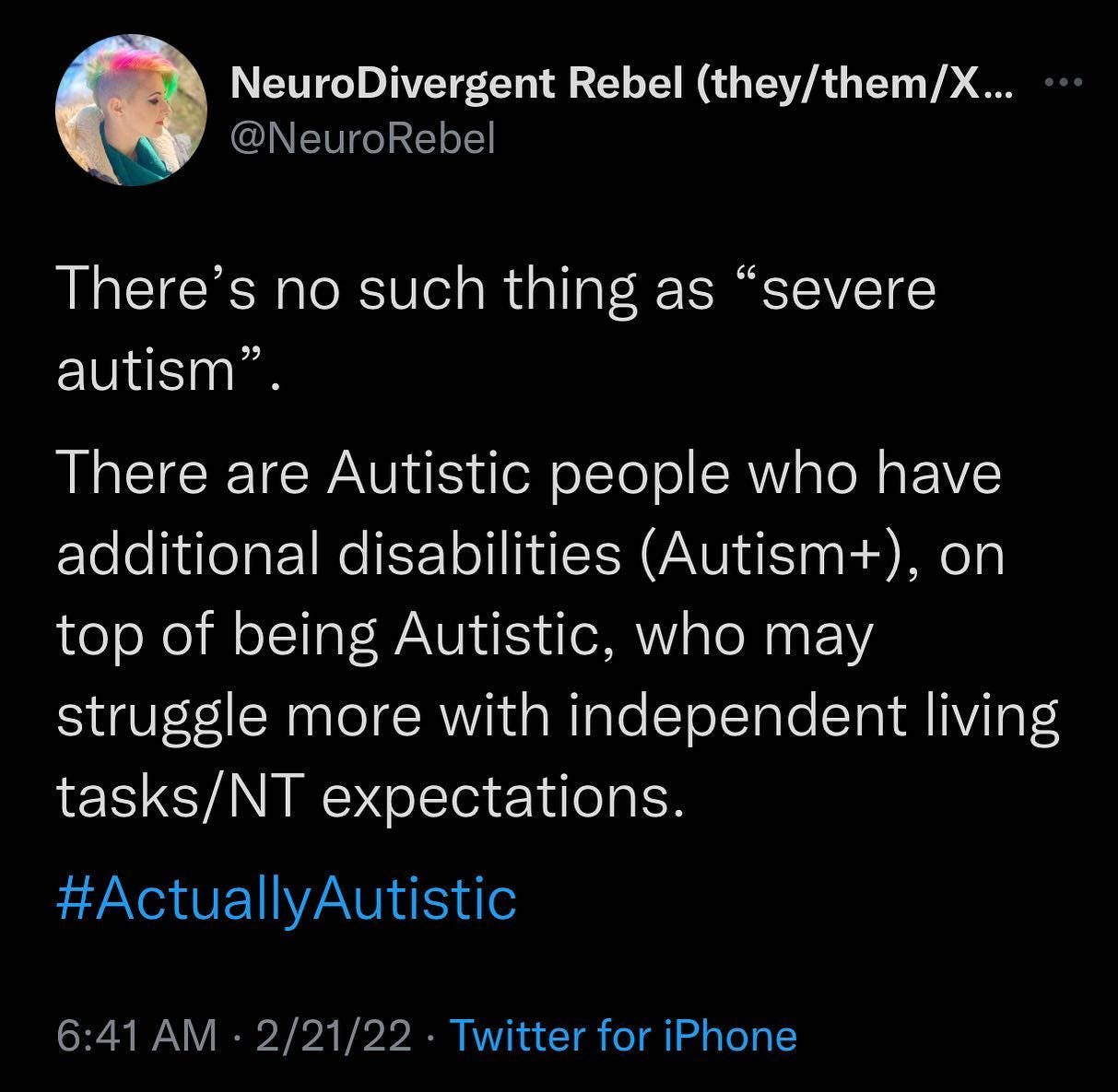When I said "There's no such thing as severe Autism" most people missed the point.
I am Autistic, PLUS (On Twitter, I typed this out as shorthand Autism+ because of character limitations, and we made jokes it sounded like a video streaming service, like Disney+).
In February 2022, four paragraphs I wrote on my Facebook page, based on a Tweet thread on the same topic, created outrage in some spaces:
"There's no such thing as severe Autism. There are Autistic people who have additional disabilities (Autism+), on top of being Autistic, who may struggle more with independent living tasks/NT (NeuroTypical) expectations."
I hadn't written much on the topic, I tried to keep my explanation clean and precise to avoid confusion, and in only a few paragraphs, I felt I'd conveyed it all.
However, only the first paragraph of my statement was shared (over and over again), omitting the sections explaining why I had this stance and the harm and dismissal that can come to Autistics when labels like "severe" are used to describe us.
What about the rest of what I said?
The people I'd upset didn't share my original post or what I had to say about the problems with lumping common co-occurring conditions under the label of "Autism" or "Severe Autism," causing our needs to be ignored by the medical systems (especially if they are more complex, as many Autistic's needs can be).
What about when I said, "This doesn't mean they are "more autistic" than Autistics who don't struggle. Being Autistic means, we are likely to have additional disabilities (seizures, motor control issues, intellectual/processing differences).
If we have multiple disabilities on top of being Autistic, of course, we will struggle more. However, lumping our additional disabilities into the autism label means it's more likely they may be written off as "part of the Autism" & ignored, so we don't get the help we need.
For example: saying, "All Autistic People are anxious" & not treating our mental health issues or "Autistic People are just like that."
When everything negative an Autistic Person experiences are lumped under the label of "Autism," Autistics suffer & our needs are neglected. Autistic People need access to more custom-tailored support, and a one size fits all approach to supporting us (because our individual needs vary significantly from person to person) won't work.
Those outraged by my statement above always seem to "miss" the rest of the text attached to my post (though it was hard to miss), ignoring the most crucial part of that message.
Not that some Autistic People won't struggle more (because some struggle greatly, and some can appear to struggle less), but that often the source of our struggles can come from things common in Autistic People that aren't necessarily inherent parts of being Autistic.
For example, a recent NeuroClastic Facebook poll got me thinking about how my ADHD hinders my life more than my Autism. It was interesting how many Autistics had similar feelings.
Autism is my operating system. It IS me. ADHD is a disruptor in that system, the little monkey making a mess of my life, like a thing I have to babysit and motivate to get anything done. When I didn't understand my ADHD, dismissing those traits as "part of my Autism," I couldn't adequately adapt my life and properly support the needs associated with being an ADHD human.
I am Autistic, PLUS (On Twitter, I typed this out as shorthand Autism+ because of character limitations, and we made jokes it sounded like a video streaming service, like Disney+).
Most Autistics are Autistic AND have additional circumstances, NeuroTypes, or medical conditions.
In addition to being Autistic, I am ALSO a Hyperlexic ADHDer. I am Autistic AND have anxiety. I'm Autistic with hypermobility disorder (which causes frequent pain and injury), sleeping problems, digestive problems, migraines, and seizures. I am Autistic+ all of my co-occurring health conditions. I have co-occurring conditions in addition to (+) being Autistic.
Some of these issues are more common in Autistic People; however, not all Autistics will experience these co-occurring conditions (which is why they are NOT part of the Autism diagnostic criteria).
When Autistic people have multiple +'s, our lives can be more complicated (or we may need more support), depending on our different experiences, NeuroTypes, or conditions in addition to being Autistic. Each item needs to be considered for us to be healthy and happy.
What I'm saying isn't even that radical as even the medical diagnostic criteria for Autism mention the importance of noting if a person has Autism plus "accompanying intellectual impairment," "with or without accompanying language impairment," listing a few other considerations common in Autistics (separate from Autism) that may require additional support.
It kills me (and literally kills many Autistic People) that we constantly have our co-occurring conditions ignored & dismissed as "just part of autism" (such as anxiety, digestive issues, sensory distress, motor control & interoceptive issues, seizures, EDS, etc.).
These things are more common in Autistic People but are also things some Autistic People will not have; therefore, they are not an innate part of the Autistic experience (though they are experiences common in Autistic individuals).
Ignoring and dismissing these traits as "part of autism" leaves Autistics without the help and care we need for our specific needs (specific health care services, mental health support, being taught skills, or how to get help when there's something we cannot do for ourselves), which is why they make a point to note if an Autistic person has any additional "medical or genetic condition" or if their Autism is "associated with another neurodevelopmental, mental, or behavioral disorder" in the diagnostic criteria.
Keep reading with a 7-day free trial
Subscribe to NeuroDivergent Rebel’s Substack to keep reading this post and get 7 days of free access to the full post archives.




